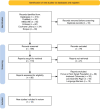Dietary Interventions in Irritable Bowel Syndrome: A Systematic Review of Clinical Outcomes, Microbiota Changes, and Inflammatory Markers
- PMID: 39483931
- PMCID: PMC11524984
- DOI: 10.7759/cureus.70568
Dietary Interventions in Irritable Bowel Syndrome: A Systematic Review of Clinical Outcomes, Microbiota Changes, and Inflammatory Markers
Abstract
This systematic review synthesizes findings from 12 studies to evaluate the effectiveness of dietary interventions in managing irritable bowel syndrome (IBS), with a focus on low-FODMAP (fermentable oligosaccharides, disaccharides, monosaccharides, and polyols) diets, probiotics, and prebiotics. The review rigorously follows the PRISMA (Preferred Reporting Items for Systematic Reviews and Meta-Analyses) guidelines and includes studies selected through comprehensive database searches. In adults diagnosed with IBS, this review assesses how effective dietary interventions, specifically low-FODMAP diets, probiotics, and prebiotics, are compared to standard management or placebo in improving clinical outcomes, modifying gut microbiota composition, and reducing inflammatory markers. Our analysis reveals that low-FODMAP diets consistently alleviate IBS symptoms and improve quality of life. However, the effectiveness of probiotics and prebiotics varies, with outcomes dependent on specific strains and individual patient microbiota profiles. The studies demonstrate significant improvements in gastrointestinal symptoms and microbiota composition, highlighting the potential of dietary strategies to beneficially modify gut health. However, the research points to the necessity of personalizing dietary approaches based on individual responses and microbiota profiles to optimize treatment efficacy. The risk of bias was assessed using the Cochrane risk-of-bias 2 tool for randomized controlled trials (RCTs) and the AMSTAR 2 tool for systematic reviews, with varying degrees of bias across the studies. This review identifies gaps in the long-term efficacy of these interventions and calls for more extensive trials to explore their sustained impacts. Our findings suggest that dietary management should be integrated into routine IBS treatment protocols and emphasize the need for further research to establish standardized dietary recommendations tailored to patient-specific characteristics.
Keywords: dietary interventions; gastrointestinal disorders; gut health; irritable bowel syndrome; nutrition therapy.
Copyright © 2024, Shams et al.
Conflict of interest statement
Conflicts of interest: In compliance with the ICMJE uniform disclosure form, all authors declare the following: Payment/services info: All authors have declared that no financial support was received from any organization for the submitted work. Financial relationships: All authors have declared that they have no financial relationships at present or within the previous three years with any organizations that might have an interest in the submitted work. Other relationships: All authors have declared that there are no other relationships or activities that could appear to have influenced the submitted work.
Figures
References
Publication types
LinkOut - more resources
Full Text Sources

